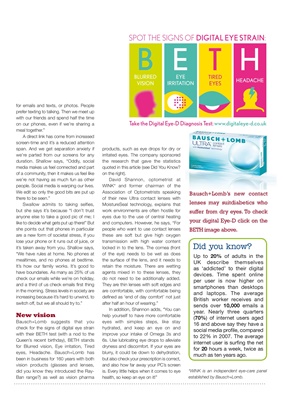
KITLIVING
bit of self-help is to keep to the four 20s
rule. You're meant to look 20ft away for
20 seconds every 20 minutes AND blink
20 times.
Psychologist Chireal Shallow notes
how our behaviour have changed with our
changing use of digital media. She says,
"As many as a third of us now uses our
screens for nine hours or more every day.
Children use devises even more than that.
Don't look now, but 74% of us check our
phones at least once an hour and 52%
every 30 minutes. It's almost an addictive
behaviour. Mobile phones are certainly not
used to talk much any more. We use them
for emails and texts, or photos. People
prefer texting to talking. Then we meet up
with our friends and spend half the time
on our phones, even if we're sharing a
meal together."
A direct link has come from increased
screen-time and it's a reduced attention
span. And we get separation anxiety if
we're parted from our screens for any
duration. Shallow says, "Oddly, social
media makes us feel connected and part
of a community, then it makes us feel like
we're not having as much fun as other
people. Social media is warping our lives.
We edit so only the good bits are put up
there to be seen. To show ourselves in a
better light."
Swallow admits to taking selfies,
but she says it's because "I don't trust
anyone else to take a good pic of me; I
like to decide what gets put up there!"But
she points out that phones in particular
are a new form of societal stress, if you
lose your phone or it runs out of juice, or
it's taken away from you. Shallow says,
"We have rules at home. No phones at
mealtimes, and no phones at bedtime. It's
how our family works. It's good to have
boundaries. As many as 25% of us check
our emails while we're on holiday, and a
third of us check emails first thing in the
morning. Psychology is very important,
both at work and at play. Stress levels in
society are increasing because it's hard to
unwind, to switch off, but we all should
try to."
New vision
Bausch+Lomb suggests that you check
for the signs of digital eye strain with their
BETH test (with a nod to the Queen's
recent birthday), BETH stands for Blurred
vision, Eye irritation, Tired eyes, Headache.
Bausch+Lomb has been in business
for 160 years with both vision products
(glasses and lenses, did you know they
introduced the Ray-Ban range?) as well
as vision pharma products, such as eye
drops. The company sponsored the
research that gave the statistics quoted
in this article.
David Shannon, optometrist at
WINK and former chairman of the
Association of Optometrists speaking
of their new Ultra contact lenses with
MoistureSeal technology, explains that
work environments are often hostile for
eyes, due to the use of central heating
and computers. However, he says, "For
people who want to use contact lenses
these are soft but give high oxygen
transmission with high water content
locked in to the lens. The cornea (front
of the eye) needs to be wet as does
the surface of the lens, and it needs to
retain the moisture. There are wetting
agents mixed in to these lenses, they
do not need to be additionally added.
They are thin lenses with soft edges and
are comfortable, with comfortable being
defined as 'end of day comfort' not just
after half an hour of wearing."
In addition, Shannon adds, "You can
help yourself to have more comfortable
eyes with simples steps, like stay
hydrated! Also, keep an eye on and
improve your intake of Omega 3s and 6s,
and use lubricating eye drops to alleviate
dryness and discomfort. If your eyes are
blurry, it could be down to dehydration,
but also check your prescription is correct,
and also how far away your PC's screen
is. Every little helps when it comes to eye
health, so keep an eye on it!"
You can check your digital Eye-D at
www.digitaleye-d.co.uk
Francesca Marchetti, Chireal Shallow and
David Shannon are all advisors on WINK, an
independent eye-care panel established by
Bausch+Lomb.
Did you know?
Up to 20% of adults in the UK describe
themselves as 'addicted' to their digital
devices. Time spent online per user is
higher on smartphones than desktops
and laptops. The average British worker
receives and sends over 10,000 emails
a year. Nearly three quarters (7%) of
internet users aged 16 and above
say they have a social media profile,
compared to 22% in 2007. The average
internet user is surfing the net for 20
hours a week, twice as much as they
would have in 2005.